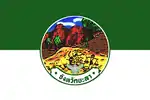Yala
| |
|---|---|
 Bueng Nam Sai, a natural lake in Raman District, 26 km from Yala City, it was once the habitat of rare species of fish Asian arowana | |
 Flag  Seal | |
 Map of Thailand highlighting Yala province | |
| Country | Thailand |
| Capital | Yala |
| Government | |
| • Governor | Pirom Nilthaya (since October 2021) |
| Area | |
| • Total | 4,521 km2 (1,746 sq mi) |
| • Rank | Ranked 47th |
| Population (2019)[2] | |
| • Total | 536,330 |
| • Rank | 50th |
| • Density | 118/km2 (310/sq mi) |
| • Rank | Ranked 45th |
| Human Achievement Index | |
| • HAI (2017) | 0.5183 "low" Ranked 72nd |
| GDP | |
| • Total | baht 43 billion (US$1.4 billion) (2019) |
| Time zone | UTC+7 (ICT) |
| Postal code | 95xxx |
| Calling code | 073 |
| ISO 3166 code | TH-95 |
| Website | www |
Yala (Thai: ยะลา, pronounced [já(ʔ).lāː] Malay: Jala[5]) is the southernmost Province (changwat) of Thailand. Neighboring provinces are (from northwest clockwise) Songkhla, Pattani, and Narathiwat. Yala is one of two landlocked provinces in southern Thailand, the other being Phatthalung.[6] Its southern part borders Kedah and Perak of Malaysia.
Geography
Yala province is in southern Thailand. The highest point of the Sankalakhiri Range (Northern Titiwangsa Mountains), the 1,533-meter (5,030 ft)-high Ulu Titi Basah (ฮูลูติติปาซา), is on the Thai/Malaysian border between Yala province and Perak.[7] The total forest area is 1,455 km2 (562 sq mi) or 32.5 percent of provincial area.[8]
National parks
There are three national parks, along with two other national parks, make up region 6 (Pattani branch) of Thailand's protected areas.
- Budo–Su-ngai Padi National Park, 341 km2 (132 sq mi)[9]: 96
- Bang Lang National Park, 261 km2 (101 sq mi)[9]: 88
- Namtok Sai Khao National Park, 70 km2 (27 sq mi)[9]: 110
Toponymy
The name "Yala" is the Thai transliteration of the Malay word "Jala" (Jawi: جالا), meaning "net", which was in turn derived from Sanskrit (Devanagari: जाल). The province is also known as "Jala" in Patani Malay language.
History
Historically, Pattani province was the centre of the Sultanate of Patani, a semi-independent Malay kingdom that paid tribute to the Thai kingdoms of Sukhothai and Ayutthaya. After Ayutthaya fell under Burmese control in 1767, the Sultanate of Patani gained full independence, but under King Rama I (reigned from 1782 to 1809), the area was again placed under Siam's control in 1785 and made a mueang. In 1808, Mueang Pattani was split into seven smaller mueang including Yala and Reman.[10]
The province was recognized as part of Siam by the Anglo-Siamese Treaty of 1909, negotiated with the British Empire, while Siam surrendered its claims to Kelantan, Kedah, Terengganu, and Perlis.
There is a separatist movement in Yala, which after being dormant for many years, emerged again in 2004 and has become increasingly violent. Eight bombs exploded in the province over two days, on 6–7 April 2014. The bombings resulted in one death and 28 injuries, as well as damage to a warehouse estimated at 100 million baht.[11]
The British Foreign and Commonwealth Office (FCO) in 2014 advised its citizens to only undertake essential travel in the province, while the Australian Government's Department of Foreign Affairs and Trade recommends that travellers completely avoid the province.[12][13]
Demographics
Together with Narathiwat, Pattani and Satun, Yala is one of the four provinces of Thailand with a Muslim majority. About 72 percent of the people are Malay-speaking Muslims and mainly live in rural locations. The remainder are Thai and Thai Chinese Buddhists, who live in towns and cities.
Symbols
The provincial seal shows a miner with simple mining tools including hoes, crowbars, and baskets. Yala was originally a mining town with tin and tungsten ores.[15]
The provincial tree is the red saraca (Saraca declinata), and the provincial flower is the bullet wood (Mimusops elengi).
Khela mahseer (Tor douronensis) is the provincial fish, since it is a rare fish that can only be found in the lower southern region. Currently, Yala Provincial Fisheries Office is able to breed.[16]
Administrative divisions

Provincial government
Yala is divided into eight districts (amphoe), which are further divided into 56 subdistricts (tambon) and 341 villages (muban).
| No. | Name | Thai | Malay |
|---|---|---|---|
| 1 | Mueang Yala | เมืองยะลา | Jala, Jolor |
| 2 | Betong | เบตง | Betung |
| 3 | Bannang Sata | บันนังสตา | Bendang Setar |
| 4 | Than To | ธารโต | Air Kedung |
| 5 | Yaha | ยะหา | Johar |
| 6 | Raman | รามัน | Reman |
| 7 | Kabang | กาบัง | Kabae, Kabe |
| 8 | Krong Pinang | กรงปินัง | Kampung Pinang |
Local government
As of 26 November 2019 there are:[17] one Yala Provincial Administration Organisation (ongkan borihan suan changwat) and 16 municipal (thesaban) areas in the province. Yala has city (thesaban nakhon) status and Sateng Nok and Betong have town (thesaban mueang) status. Further 13 subdistrict municipalities (thesaban tambon). The non-municipal areas are administered by 47 Subdistrict Administrative Organisations - SAO (ongkan borihan suan tambon).[2]
Transportation

In January 2022, Thailand's transport ministry completed the 1.9 billion baht Betong Airport. It opened in March 2022.[18][19] Designed to handle 300 arrivals per hour, it is projected to serve 300,000 per year, which will later increase to over one million passengers per year, generating three billion baht for the district. Nok Air, Bangkok Airways, and Malaysia's Firefly Airlines had plans to fly to Betong in 2019.[20] As of December 2022, only Nok Air and Bangkok Airways fly to Betong, with a twice-weekly service to Bangkok's Don Mueang Airport. The next nearest Thai airport to Yala is Hat Yai International Airport in Songkhla province.
Yala is served by the State Railway of Thailand from the Yala Railway Station.
The province lies on Route 410 (Pattani–Betong Highway), which runs from Pattani through Yala and Betong before passing through the Thailand-Malaysia Border.
Health
Yala's main hospital is Yala Hospital, a regional hospital operated by the Ministry of Public Health.
Human achievement index 2017
| Health | Education | Employment | Income |
| 56 | 70 | 60 | 43 |
| Housing | Family | Transport | Participation |
 |
 |
 |
|
| 42 | 52 | 64 | 65 |
| Province Yala, with an HAI 2017 value of 0.5183 is "low", occupies place 72 in the ranking. | |||
Since 2003, United Nations Development Programme (UNDP) in Thailand has tracked progress on human development at sub-national level using the Human achievement index (HAI), a composite index covering all the eight key areas of human development. National Economic and Social Development Board (NESDB) has taken over this task since 2017.[3]
| Rank | Classification |
| 1 - 15 | "high" |
| 16 - 30 | "somewhat high" |
| 31 - 45 | "average" |
| 45 - 60 | "somewhat low" |
| 61 - 77 | "low" |
| Map with provinces and HAI 2017 rankings |
 |
See also
References
- ↑ Advancing Human Development through the ASEAN Community, Thailand Human Development Report 2014, table 0:Basic Data (PDF) (Report). United Nations Development Programme (UNDP) Thailand. pp. 134–135. ISBN 978-974-680-368-7. Retrieved 17 January 2016.Data has been supplied by Land Development Department, Ministry of Agriculture and Cooperatives.
- 1 2 "รายงานสถิติจำนวนประชากรและบ้านประจำปี พ.ศ.2561" [Statistics, population and house statistics for the year 2019]. Registration Office Department of the Interior, Ministry of the Interior (in Thai). 31 December 2018. Retrieved 20 June 2019.
- 1 2 Human achievement index 2017 by National Economic and Social Development Board (NESDB), pages 1-40, maps 1-9, retrieved 14 September 2019, ISBN 978-974-9769-33-1
- ↑ "Gross Regional and Provincial Product, 2019 Edition". <>. Office of the National Economic and Social Development Council (NESDC). July 2019. ISSN 1686-0799. Retrieved 22 January 2020.
- ↑ Bernama. "Barisan Revolusi Nasional (BRN)". Air Times News Network. Retrieved 2022-03-16.
- ↑ Lian Lim, Siew (2013). "The Role of Shadow Puppetry in the Development of Phatthalung province, Thailand" (PDF). siewlianlim.com. Southeast Asia Club Conference, Northern Illinois University. Retrieved 27 August 2018.
- ↑ "Gunong Ulu Titi Basah: Thailand". Geographical Names. Information Technology Associates. 1995–2012. Retrieved 8 April 2014.
- ↑ "ตารางที่ 2 พี้นที่ป่าไม้ แยกรายจังหวัด พ.ศ.2562" [Table 2 Forest area by province 2019]. Royal Forest Department (in Thai). 2019. Retrieved 6 April 2021.
- 1 2 3 "ข้อมูลพื้นที่อุทยานแห่งชาติ ที่ประกาศในราชกิจจานุบกษา 133 แห่ง" [National Park Area Information published in the 133 Government Gazettes]. Department of National Parks, Wildlife and Plant Conservation (in Thai). December 2020. Retrieved 1 November 2022.
- ↑ "Welcome to Yala: Introduction". Sawadee.com. Retrieved 27 Apr 2015.
- ↑ "Four more bombs explode in Yala this morning". MCOT. 7 April 2014. Retrieved 8 April 2014.
- ↑ "Foreign travel advice Thailand". GOV.UK. Crown. 25 March 2014. Retrieved 8 April 2014.
- ↑ "Thailand". smartraveller.com.au. Australian Department of Foreign Affairs and Trade. 3 April 2014. Retrieved 8 April 2014.
- ↑ รายงานคุณภาพชีวิตประชาชนจังหวัดยะลา จากข้อมูล จปฐ. / กชช. 2ค ประจำปี 2562 (PDF). Yala Community Development Office. 2019. p. 13.
- ↑ "Yala province". cmgfthailand.psu.ac.th.
- ↑ ""พลวงชมพู"ปลาประจำจังหวัดยะลา" ["Khela mahseer" the Yala provincial fish]. Kom Chad Luek (in Thai). 2018-07-01. Retrieved 2020-04-22.
- ↑ "Number of local government organizations by province". dla.go.th. Department of Local Administration (DLA). 26 November 2019. Retrieved 10 December 2019.
45 Yala: 1 PAO, 1 City mun., 2 Town mun., 13 Subdistrict mun., 47 SAO.
- ↑ "Govt plans DMK-Betong flight roster". Bangkok Post. 19 May 2019. Retrieved 19 May 2019.
- ↑ Sritama, Suchat (27 August 2018). "Better days around the bend". Bangkok Post. Retrieved 27 August 2018.
- ↑ Nanuam, Wassana (5 July 2019). "Betong airport runway will be extended, says army chief". Bangkok Post. Retrieved 5 July 2019.
External links
 Yala travel guide from Wikivoyage
Yala travel guide from Wikivoyage- Province page from the Tourist Authority of Thailand
- (in Thai) Website of the province